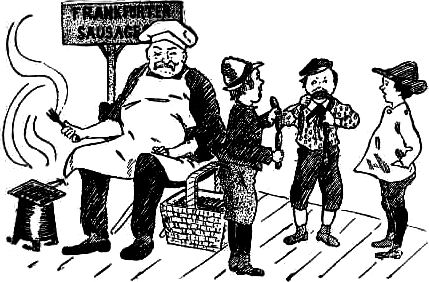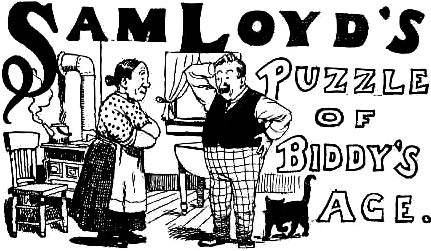



Here is a financial problem pertaining to partnership relations, profit and loss or partial payments which I would not have to propose if that clumsy Dutchman had not placed his head so as to obstruct a view of the price of frankfurters.
It appears that three little boys from Harlem lost their way to school, and in their frantic efforts to locate the school, if it was to be discovered within the extended boundary of the metropolis, found themselves at the lunch hour wandering aimlessly along the Bowery at Coney Island.
When they all met under the long pier to discuss the various products of the place it was found that Harry had secured four frankfurters and Tommy seven. To pay for his part of the banquet Jim chipped in eleven cents, which Harry and Tom proceeded to divide between the two, so as to equalize finances. It has a puzzling look to the mathematician, but to these young boys, fresh from school, it was no more trouble to divide eleven between two than it was to put eleven frankfurters into three. In fact, it did not lake them an instant longer than it did to decide not to harrow the feelings of their parents by mentioning their misfortunes. What they told their teacher would be too complex a question for our puzzlists. The present problem is to show how eleven cents were divided equitably between Harry and Tommy, which you can readily do when you have figured out the price of frankfurters.
In the Frankfurter problem all that Harry had to do was to remember that if Jim paid 11 cents the others were supposed to have paid the same, which would make the 11 frankfurters worth 33 cents. Harry had bought 4 for 12 cents, so he should have 1 cent. Tommy had bought 7 for 21 cents, so he wants 10 cents of the money, and then each boy will have chipped in 11 cents. Concerning the equitable division of the sausages, it may be said that each boy was entitled to eat three and two-thirds of a sausage for his portion.
2. The Herd of Camels
An Arab sheik, finding himself about to die, called his sons about him and said:
“Divide my camels among you in the proportion of one half of the herd to the eldest son, the second son one-third, and to the youngest son one-ninth.
Thereupon the oldest son cried: ”O, my father, one-half, one-third, and one-ninth do not constitute a whole. To whom, therefore, shall the remainder of the herd be given?”
“To any poor man who may be standing by when the division is made,” replied the sheik, who thereupon died.
When the herd was collected a new difficulty arose. The number of the camels could not be divided either by two or three or nine. While the brothers were disputing, a poor but crafty Bedouin, standing by with his camel, exclaimed, “Behold, I will sell you my beast for ten pieces of silver, so that you may then divide the herd.”
Seeing that the addition of one camel would solve the difficulty, the brothers jumped at the offer, and proceeded to divide the herd, but when each had received his allotted portion there yet remained one camel.
“I am the poor man standing by,” said the crafty Bedouin, and, gaily mounting the camel, he rode away, with the ten pieces of silver in his turban.
Now. How many camels were in the sheik’s herd?
To the best of my knowledge and belief this beautiful problem has never been presented correctly before. In garbled form it is given in the puzzle books, or even by professors to illustrate a paradoxical situation which could be corrected by the introduction of one more camel. They omit the all-important sentence, “Divide the camels in the proportion of one-half and one-third and one-ninth.” That word “proportion” is the saving clause which makes the problem sound.
There were 17 Camels in the herd.
3.

Biddy was very sensitive on the matter of her age. So for the last two score years she has invariably answered queries pertaining to her earthly sojourn by the following little verse, which was doubtless quite correct when first perpetrated:
“Five times seven and seven times three
Add to my age and it will be
As far above six nines and four
As twice my years exceeds a score.”
Can you tell Biddy’s age?
According to Biddy’s verse her age is as much more than two as twice her age is than twenty. This makes her eighteen forty years ago and fifty-eight now.
[Page 57]